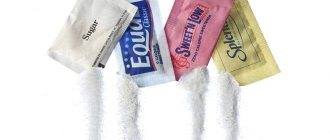Fats
In order for us to logically move further in the reasoning of the article, we need to understand what kind of fats we eat in general, and why so much attention is directed to fish oil. Therefore, below we will consider fats in general.
I will not describe chemistry, since Geektimes has a wonderful article “About fats from a chemist’s point of view” - here we will look at which ones and how much we need to eat.
If we study the WHO recommendations from 2008 + Methodological state nutritional recommendations for the United States for 2015-2020, then we can create a conditionally optimal table of daily fat intake.
How much fat should you eat per day?
It depends on how many kcal you need per day. For example, let's take the norm of 2000 kcal per day. Each person has his own norm; to begin with, I would recommend taking data from the official US table. On average, this table is quite ok.
So:
- On average, 1 gram of oil/fat contains 9 kcal.
- WHO recommends a fat intake of 15 to 30% of calories per day (% minimum and maximum).
- At 2000 kcal, 300 to 600 kcal per day should come from fat, or 33 to 66 grams of fat.
According to life extension technologies and many modern books, it is better to eat more fat, that is, for ourselves we can take a norm of about 20-30% fat per day.
What kind of fats and how much should you eat per day?
For the purpose of nutritional recommendations, fats are divided into different types. Each of them must be received in food in a certain proportion. WHO recommendations for these proportions as a percentage of daily calories are given below. At the same time, it is important to understand that you do not need to count everything to commas after zeros, this is just information for a gradual and harmonious adjustment of the power supply.
Daily intake as a percentage of daily fat:
- saturated - no more than 10% (no more than 22 grams)
- Trans fats of two types - artificial (margarines, crackers, chips, etc.) - DO NOT EAT AT ALL. - natural - (cheese, meat, etc.) - can be left, a little comes in the total mass
- polyunsaturated from 6 to 11% (from 12 to 24 grams), among them: - Omega-6 from 2.5 to 9% (from 1 to 6 grams) - Omega-3 alpha linoleic acid - 0.5% (1 gram ) - EPA and DHA from 0.25 to 2 grams
- monounsaturated - the remainder of all. For example, we ate 10g. saturated, 20 grams polyunsaturated, then you can eat from 3 to 30 grams monounsaturated
Now we need to understand which oils and which foods contain which fats, and we can easily and gradually correct nutrition in the right direction.
To do this, we made a beautiful table with a fat chart (compiled by Lifext with the help of the community). All data is taken from US government sites, sometimes partially from the English wiki.
If you roughly build your proper nutrition based on fats, then from this table and the recommended consumption rates for different types of fats, you can draw the following conclusions:
- We get a lot of saturated fats if we eat meat, butter, and dairy products.
- Saturated fats also come with any baked goods, cookies, chips, cakes, etc., since they usually use palm and/or coconut oils.
- We get a lot of Omega-6, since there is a lot of it in most vegetable oils. For example, in sunflower, which is used in many places.
- Monounsaturated fats are also supplied in normal amounts.
- But there is a problem with Omega-3. Although they are needed in small quantities, they are irreplaceable and are not synthesized in the body.
- There are different types of Omega-3, we are interested in the types: - ALA (ELA) - found in vegetable oils, you need to include in your diet one of the oils that contains a lot of them - EPA (EPA) + DHA (DHA) - found in fish oil and butter seaweed
The question is whether it is possible to simply eat a lot of Chia seeds or flaxseed oil and have EPA + DHA synthesized from ALA (ELA) is discussed in the comments.
Interestingly, fish do not produce Omega-3 EPA + DHA themselves; they accumulate them when they eat seaweed or other fish. At the same time, predatory fish may have more Omega-3 in their fat because they eat other fish. But, on the other hand, there is more mercury and other unhealthy things, since she also absorbs them from the fish she eats. Therefore, in theory (just my conclusion) vegetarian pills with EPA + DHA from seaweed are the safest, but also the most expensive. (see below)
Note: at this stage, all the links we provide are affiliate links, since we are testing hypotheses on how to monetize - a paid application (which you don’t want) or affiliate programs with clinics, drug sellers, etc. We will later write a separate article on our experience on this topic. If you have any suggestions about this, write in the comments, we take your comments very seriously.
Should I take fish oil supplements now?
According to the results of one of the studies above, it was shown that if you can eat fish 2-3 times a week, then this is more effective than taking supplements.
Therefore, if you have the opportunity to cook or eat in a cafe with normal fish, then it is logical not to take fish oil as a supplement - this is the best option .
If this is not possible or you are lazy, then, despite the contradictory results of research in recent years, I conclude that taking fish oil to prolong life is useful. Logic points for this decision:
- Some studies have shown that there are benefits for the brain.
- The studies showing no benefit were in people with pre-existing cognitive impairment, but as a preventive measure it appears to work.
- For the heart, the results are also contradictory, either there is a benefit or not.
- There are no side effects in all studies, so taking it is not harmful.
- We have nowhere else to get EPA+DHA.
Supplements: how to choose, how much to drink
A couple of quotes to start with, not meant to be followed, but just for a more general point of view.
Kurzweil, book “Transcend” 2010.
The recommended daily intake of fish oil is 1100 mg for women and 1600 mg for men, while the optimal intakes of EPA and DHA are 1000 and 600 mg per day, respectively. To comply with these standards, it is enough to eat fish three times a week and take fish oil daily. There is currently no RDA for omega 3 fats, but the National Institutes of Health recommends healthy adults consume 4 grams of these fats per day. Our ONA for EPA is 750-3000 mg per day and for DHA is 500-2000 mg per day. Vegetarians can get 2.5 grams of omega 3 fats with every teaspoon of flaxseed oil. Some worry that fish oil supplements may be contaminated with mercury. The California Safe Drinking Water and Toxic Control Act of 1986 requires fish oil capsules to contain less than three ppm of mercury. And because most manufacturers want to be able to sell their products in California, this ruling has had a major impact throughout the country, and today the majority of fish oil capsules meet this standard.
Perlmutter, book “Food and the Brain.” 2013.
So, it's time to start a daily supplement regimen that you will follow for the rest of your life. ....DHA: 1000 mg daily (note: DHA can be purchased in combination with eicosapentaenoic acid (EPA); choose a supplement derived from fish oil or seaweed)
Based on research, Lifext's recommendation is based on WHO norms and US dietary guidelines, for healthy people over 20 years of age.
- eat fish three times a week, preferably fatty varieties
- if this is not possible, then in this case take fish oil 2-4 grams per day (once or twice), along with food
Recommended complex for daily use
- Omega-3 (if you eat fish 2 or more times a week, you should NOT take this supplement)
- Vitamin D
- Mineral set
- Probiotics that survive outside of the refrigerator - Probiotics are very important for overall health, drink 1 time per day, with breakfast. We buy these particular ones, since they can mostly spoil outside the refrigerator and when we buy them, there is no guarantee that they have survived.
- 1 serving of protein daily, preferably in the morning (preferably replaced with 2 boiled eggs, ideally with avocado or extra virgin olive oil)
Fish oil and vitamin D are very important for both the brain and body, minerals and protein are important for the long-term health of the body. It is advisable to take it for those over 30 years old.
After 35-40 years, you can also start taking a couple of supplements for youthful skin and tissues and healthy joints:
- Collagen types 1 and 2"
- Collagen UC-II
Fish oil VS flaxseed oil
A common question, just a short one here. The term Omega-3 refers to three different polyunsaturated fatty acids (see wiki)
- alpha-linolenic acid (ALA)
- eicosapentaenoic acid (EPA)
- docosahexaenoic acid (DHA)
We go to the table with fats and see that ALA is found in vegetable fats. For example, linseed oil contains 55%. But EPA + DHA is found only in fish oil. Therefore, one does not replace the other.
For complete vegetarians, EPA + DHA can be obtained from seaweed, for example, such supplements are offered by the well-known manufacturer Nordic-Naturals - they are expensive, but, in theory, should be the safest in terms of side substances (not 100% sure).











